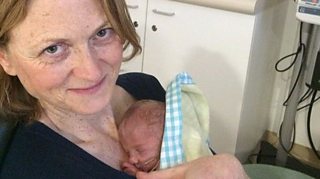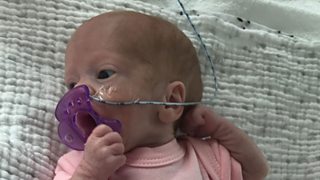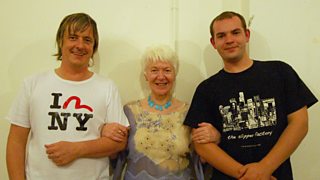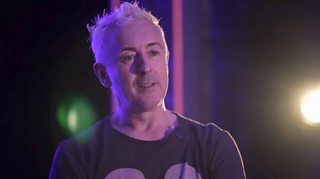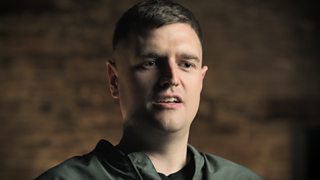The people helping extremely premature babies fight for survival
Celebrating the arrival of a new-born child is one of the most joyous occasions in a family's life, but what happens when a baby is born prematurely to a level that is considered life-threatening?
Tiny Lives follows the stories of some of the most extreme cases of premature birth faced by University Hospital in Wishaw – including the story of baby Charlie, who was born half-way through his mother's pregnancy at 23 weeks.
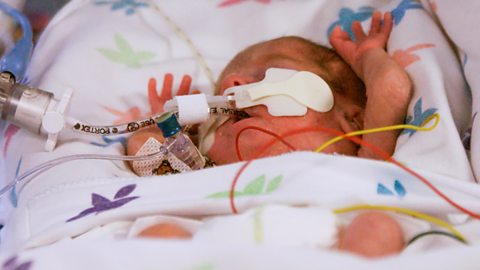
Baby Charlie's fight for survival over his first weeks and months
The staff at University Hospital Wishaw care for Charlie – who was born at 23 weeks.
The staff of the neonatal department of University Hospital Wishaw are often required to work on difficult cases involving extremely premature babies.
If you don’t have hope you don’t really have anything... you've just got to hold onCharlie's mum
Consultant Lorraine McGrory explained just how serious it can be when babies are born before the end of a full-term pregnancy:
“This sort of gestation, you’re talking about 3 babies out of 10 will survive – of them, about half will have at least a moderate to severe disability.
“You’ll often see that these little ones, for the first few hours and even for the first couple of days, will be relatively stable and then there’s a high chance that they may become more unwell or deteriorate so it’s just kind of taking it each hour by hour.”
As well as aiming to ensure the health of the babies, medical staff also help mothers and fathers connect with their babies who are often kept in incubators for a number of weeks. Avril is one of the nurses at University Hospital Wishaw who helps new parents connect with their child:
"Mums obviously get the cuddles to help with her hormones – to produce her milk – but dad’s part of the family as well. We always find that dads don't want to [hold their babies] in case they break them. But, as you saw, he thoroughly enjoyed it."
The efforts of the staff at University Hospital Wishaw's neonatal unit have saved the lives of many young babies over the years, but Consultant Stuart Guthrie understands that there are some cases – like Charlie's – that have potential to be extremely touch and go:
"I do believe in miracles, but it's difficult to use these words in a healthcare setting without coming into difficulties. Charlie's an excellent example of somebody who was at points on quite a knife edge with regards to his survival chances but he is now very well. I fully expect his survival and I expect him to go home and live a full and active life."
What does it take to care for the sickest premature babies?
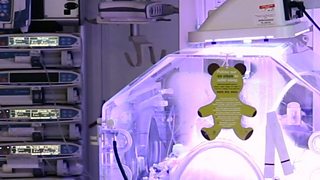
Take a look inside the Neonatal Intensive Care Unit at Burnley General hospital. (From 2017)
Caring for premature babies
-
![]()
Premature baby's first Christmas: 'I didn't think she'd survive'
Ivy-Rose was delivered 10 weeks early after she stopped growing, but there were more problems ahead.
-
![]()
The photos helping predict life-altering consequences of premature
Scientists are at the ‘tip of the iceberg’ in understanding the impact of early birth.
-
![]()
'Parents of premature babies need help'
Mark Griffin MSP – whose daughter was born prematurely – called for help for low-income parents of premature babies in hospital.
Latest features from ����ý Scotland
-
![]()
'Wild swimming helps me process the grief of losing my son'
The benefits of cold water therapy.
-
![]()
Winter adventures are appealing, but an expert advises caution
Trips in winter require particular knowledge and skills.
-
![]()
The rescuers: Why volunteers risk their lives in mountain emergencies
Landward meets members of the Cairngorm Mountain Rescue Team.
-
![]()
‘Look for the light’ – practical tips to help you through another winter with SAD
Useful advice and tips to combat low moods at this time of year.
-
![]()
How you could be a binge drinker without even knowing
Binge drinking is classed as fewer units than many people may realise.
-
![]()
How chocolate biscuits and drama classes helped one man leave prison behind
The healing power of creativity.
-
![]()
'When people believe in you, it’s life-changing'
Author Graeme Armstrong revisits the man who helped turn his life around.
-
![]()
The 'breath-taking' display of US birds swept on to British soil
Recent storms have brought rare birds to our shores.
-
![]()
Six things we learned about Alan Cumming on Take the Floor (Spoiler: includes accordions)
The actor spoke to Take the Floor's Gary Innes.
-
![]()
How street gangs trap young men in a dangerous cycle of violence
The almost inescapable pull of life in a gang.
-
![]()
Why stylist Gok Wan believes there's no such thing as bad fashion
The fashion expert says we should stop following rules and do what feels right.
-
![]()
Is sending a CV still the right way to apply for a job?
They've been central to job applications for years, but are they worth it?

